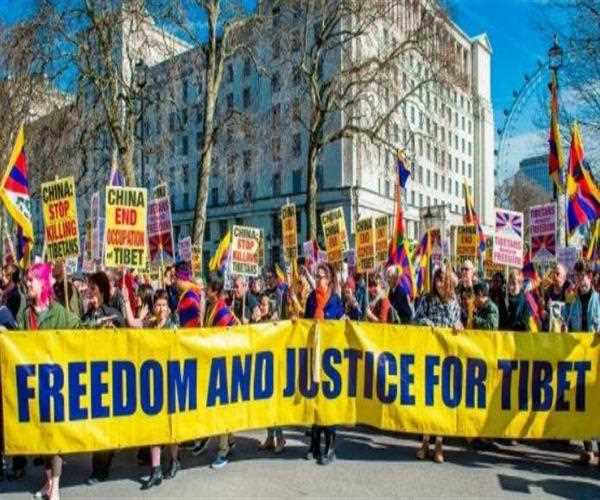
03-Jul-2020
Time For India To Take A Call For Free Tibet Campaign
As long as Tibet was an independent nation between India and China as a buffer state, China's border dispute with India was negligible, but since China annexed a peace-loving nation like Tibet due to its expansionist policy. With this, he tried to infiltrate into India's borders. Now, he has begun to claim Arunachal Pradesh as Southern Tibet.
Given the encroaching attitude of China, the time has come for India to rectify the mistake and raise its voice in favor of Tibet. He should also try that the world community should raise its voice with him. Anyway, the issue of liberation of Tibet is still alive. Most Tibetans living in China-occupied Tibet have been kept completely isolated from the world, yet Tibetans living in other countries remain the strength of their liberation practice, the Freedom Movement.
March 10 is a very important day in the history of Tibet. It is a day of plundering Tibet's cultural, religious, political heritage. It is the beginning of the non-violent liberation practice of Tibetans after the horrific bloodshed and massacre.
Tibetans are refugees in other countries because they have to go to their free nation of Tibet one day. Every ten March this flame of revolution is ignited a little more. The speed of any freedom movement is that every next movement grows larger than the previous until it achieves its goal.
A large section of the world's people, including Indians, are in favor of Tibet. India has an ancient tradition of supporting the movement of liberating nations. The political class of India and society here should give energy to this tradition. However, it is also necessary to consider where mistakes have occurred in India.
At the same time, on October 24, 1950, Peaking Radio announced that China's Liberation Army was growing in Tibet at the same time India should have been cautious. Then we got freedom from the new British. In such a situation, it was also necessary for India's security by assisting Tibet and maintaining it as a buffer state. After 1947, when the British left India, the telegraph and trade continued with India in Tibet.
Rightfully India could extend a helping hand to Tibet, but she kept silent. He should have at least put his diplomatic efforts in favor of Tibet. The whole world community too kept watching a quiet nation like Tibet as a devotee of China. Probably everyone had vested interests with their respective China.
At the time when the brave people of Tibet started a mass movement there in 1959, a big country like India should have aroused the opinion of Tibet by awakening the world public opinion. Uniting countries that were feeling threatened by China's imperialist policy.
The United Nations has strongly criticized the suppression of the Tibetan people by China by passing resolutions in 1959–60 and 1965. In India too, this issue has been brought up on the floor of the House many times.
The United States Senate in 1991 recognized Tibet as a nation enslaved by China and supported the liberation of Tibetans, but they did not have much impact on China. Only criticism and condemnation will not affect egoistic China. He has been an expansionist country from the beginning. Its attitude towards capturing the land of the surrounding countries is increasing. Along with Tibet, East Turkistan, Southern Mongolia, Taiwan, Hong Kong, etc., he is now eyeing countries like Nepal and Bhutan.
READ HERE MORE : An Idea Of Aggressive Strategy Against China
In 1949, Chinese ruler Mao made a comment in relation to South Asia that Tibet is our palm and Ladakh, Nepal, Sikkim, Bhutan and NEFA i.e. Arunachal Pradesh are our fingers. This imperialist declaration of Mao has been the basis of China's South Asian policy ever since.
Even today, the border that China has named the Indo-China border is actually the Indo-Tibet border. In 1950, China invaded the eastern region of Tibet, and gradually by 1959 its army colonized the whole of Tibet. Soon after this, China started claiming its claim on a large part of India, which resulted in the 1962 Indo-China war.
The people of any country cannot be kept under pressure for long. The more the resentment of any resentment, the more explosive it is. Tibet is a large landmass, which has its own distinct political, geographical, cultural identity.
People, there has a different way of living that does not match the Chinese. More than eighty percent of them are close to Indian customs and living. That is why they consider India as their master country.
This relationship goes back to the time of the adoption of Buddhism. Despite the oppressive rule, the spark of liberation from foreign rule is still remaining in Tibet. Ratnagrabha remains like a mountain rising from the womb of the earth. The echo of the times is unmistakable now - Tibet, independent Tibet.

Content Writer/Journalist
I am a content writter !
Join Our Newsletter
Subscribe to our newsletter to receive emails about new views posts, releases and updates.
Copyright 2010 - 2026 MindStick Software Pvt. Ltd. All Rights Reserved Privacy Policy | Terms & Conditions | Cookie Policy